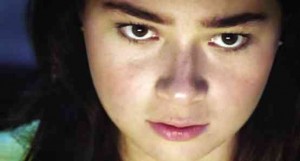The local films that came out after the MMFF season have nothing to crow about: Touted to be “too scary for commercial viewing,” Tikoy Aguiluz’s “Tragic Theater” initially impresses with its glossy look and compelling premise, about the attempted exorcism of the restless spirits of the 150-plus victims who perished in the Manila Film Center tragedy in the early ’80s.
Unfortunately, Aguiluz’s chiller is more comfortable trotting out horror-film clichés than telling a logical and comprehensible tale. In fact, its trailer is spookier than any single scene you’ll see in the film itself.
In one sequence, a priest (John Estrada) and some “spirit questors” are seen frantically trying to extricate themselves out of the ghoul-infested theater, only to be seen heading back to the same venue in succeeding scenes. Talk about harboring a death wish.
In most horror flicks, the mood and atmosphere carefully created help viewers suspend disbelief that the lurking shadows we see will soon scare the bejesus out of us—but, in “Tragic Theater,” it’s hard to sustain fear when ghostly faces do nothing more than leer at you.
Viewers are more shocked over Andi Eigenmann’s obliviousness and inability to resist answering her ringing cell phone while everyone else is asking the spirits to reappear!
Her companions are just as clueless: When she begins to levitate, one of them casually shouts, “Hoy, bumaba ka d’yan!”—as if they were just playing a game.
Then, there’s that scene-stealing disembodied arm that would give “The Addams Family’s” Thing a run for his cuticles—but, let’s not go there!
Suffice it to say that when we made our way out of the theater, a moviegoer in front of us muttered in frustration, “What was that about?”
‘Edsa Woolworth’
We expected an affection-hooking “dramedy” from John-D Lazatin’s “Edsa Woolworth,” about the title character (Pokwang) and her siblings (Ricci Chan, Prince Saruhan), who must take care of their widower American stepfather, Frank (Steven Spohn), when he’s diagnosed with Alzheimer’s disease.
The movie plays out like a convoluted telenovela, with predictable side and back stories for each of the characters.
It doesn’t take long for the production to succumb to a morass of dodgy plotting, Pokwang’s knee-jerk and inappropriately pa-kwela characterization, the simplistic treatment of its subject matter, and Lazatin’s inability to explore contentious issues in a compelling manner.
The exposition offers some intersecting tales, but the confounding combination of audience-pandering situations, as well as their mind-bogglingly facile resolution, don’t make for a satisfying whole.
We did enjoy Chan’s short but gorgeously rendered song number, “Felt Like Love”—unfortunately, a memorable tune doesn’t a good movie make.
